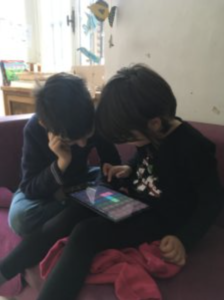In the last decade, technology has taken over so much to become part of every person’s daily life; this applies to all age groups, certainly among adults but also among children. The use of digital technology by the youngest members of society is often criticised, even though, if used in a conscious and reasoned way, these technologies can represent alternative and very efficient teaching methods.
Better Places, an association of social promotion in the Biella area, in collaboration with Fondazione Pistoletto’s Open School, has highlighted the power of technology in children’s education with a podcast called ‘5 things you don’t know about …‘. It consists of a total of six episodes in which the speakers are children aged 6 to 10, who talk about aspects that “you might not know” relating to specific topics the young students feel connected to, such as play, sport, but also animals and the importance of a vegetarian diet. These episodes have been broadcasted by “Better Radio“, the community radio in web format, born from an idea of Better Places with the desire to foster social communication while maintaining the physical distance required during the period of the COVID-19 pandemic.

Nicholas Ferrara, the member of the association who managed the project and the realisation of the podcast, explained how “in this case, as with other workshops part of educational projects carried out in the past, radio, or rather the podcast, has proved to be the best medium for developing children’s digital creativity through the means of modern communication”. The podcast, in fact, with its ease of use, its changeability and the possibility of deferred listening, allowed the children to be the authors of the music, contents and interpretations of the six recorded episodes. However, as mentioned by Nicholas, “the idea of the podcast was also the result of circumstances, since it was made possible thanks to the contribution of the Presidency of the Council of Ministers through the public call EduCare, which enabled the purchase of several tablets that were essential in the creation and editing of the various episodes”.
This podcast, which gave the children the opportunity to act in first person and acquire numerous technological skills, is actually part of the broader project “Learning Neighbourhoods and Experiential Oases”, born from the collaboration between Open School and Better Places, which ran throughout the school year. The project dealt with the theme of communication through the use of different tools from podcasting to drawing, “working on the integration between subjects and on personal emotions, since even the youngest know the importance of being aware of what they feel and what they want to express before being able to converse with the other”, as Nicholas pointed out. This project and the related workshops have been very gratifying and Nicholas concluded that “the medium of the podcast will, no doubt, also be proposed to other institutions”.
The association Better Places has therefore demonstrated that the use of technology by children is not always dangerous or harmful, as it is often thought, but it represents a different way of learning to communicate emotions and express creativity.

